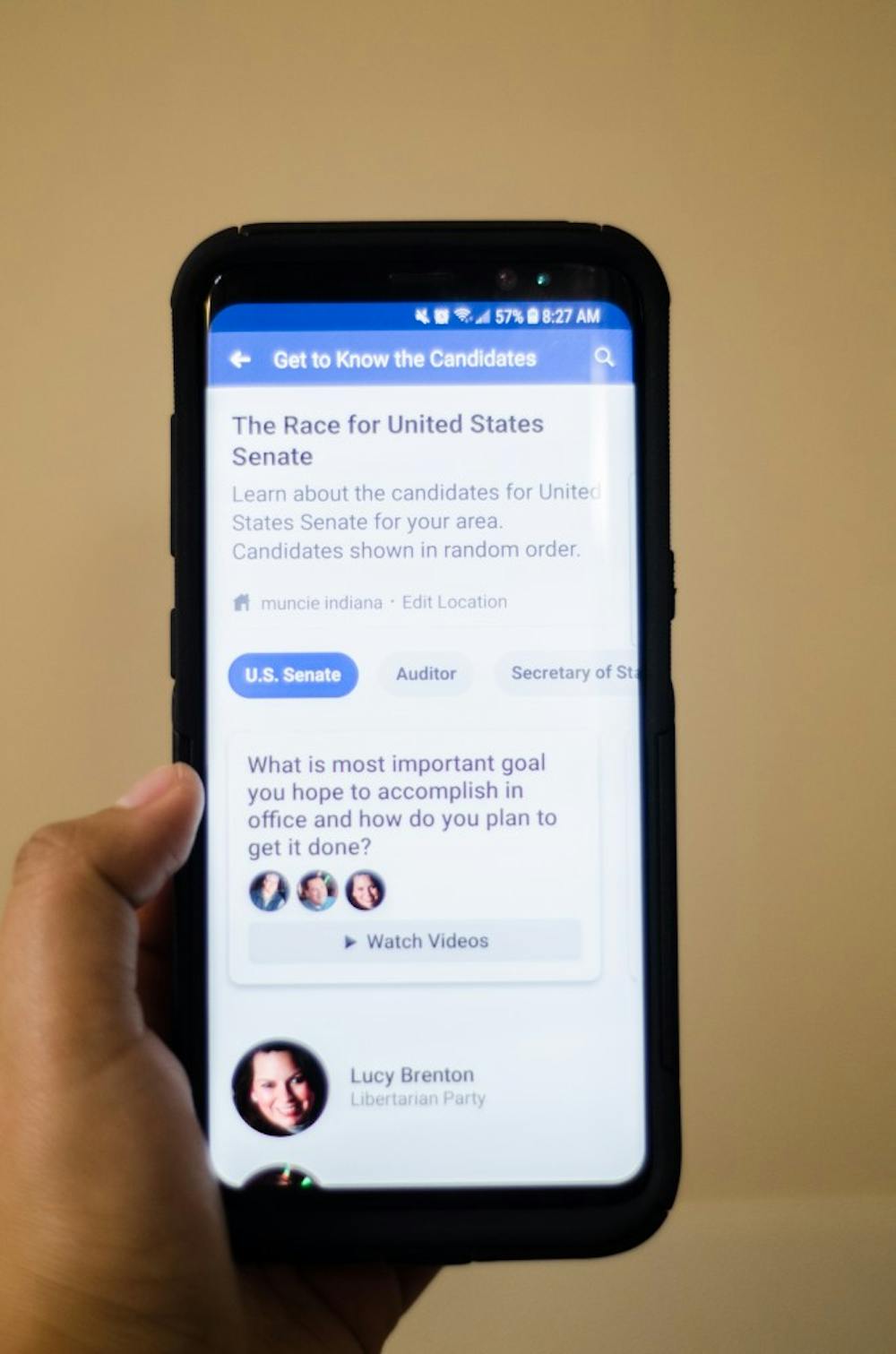Editor’s note: Dominic Bordenaro previously wrote columns for The Daily News.
While the donkeys and elephants battle it out for national, state and local seats, members of the Ball State community shared their opinions on what issues they consider important leading up to Nov. 6.
Healthcare:
A2018 Pew Research survey conducted Sept. 24 to Oct. 7 reported 70 percent of adults said affordability of healthcare was a very big problem.
Another Pew Research survey conducted Sept. 18 to 24 stated 58 percent of registered voters said it is the responsibility of the federal government to make sure all Americans have health care coverage.
Dominic Bordenaro, president of Ball State’s College Democrats, said healthcare was one of the bigger issues dominating the airwaves both nationally and in Indiana.
“Thanks to Obamacare I can stay on my parents’ health insurance until I’m 26,” Bordenaro said. “By then, hopefully I’ll have a job that offers me health insurance, but that’s just not the case for everybody.”
Jobs:
Sean Hildebrand, assistant professor of political science at Ball State, said most of the Senate race advertisements in Indiana are jobs-related, like ones accusing Sen. Joe Donnelly and former Indiana State Rep. Mike Braun of outsourcing jobs to Mexico and China, respectively.
“In Indiana, we’re recovering still to some degree from losing jobs 12 years ago,” Hildebrand said. “So that kind of stuff still resonates in the voting population.”
According to the 2018 Pew Research survey, 25 percent of Americans said job opportunities for all Americans is a big problem, compared to 47 percent in a survey conducted shortly before the November 2016 elections.
The survey also said the share of Republicans who said it was a major problem dropped from 53 percent in 2016 to 14 percent today. In comparison, the same share for Democrats dropped from 42 percent to 33 percent.
Isaac Miller, president of Ball State’s College Republicans said, “It’s weird seeing the Senate race ads, and them both attacking each other for outsourcing products to China, or other countries, because that hasn’t been a big issue recently.”
Isaiah Buck, a freshman telecommunications major, said promoting “free market capitalism” was important to him.
“I feel like a lot of people are very against it,” Buck said. “And I mean personally, I’m a conservative, so keeping the Republican majority is one of the main things I’m kind of focusing on as well.”
Affordability:
Bordenaro said college debt and financial assistance to students is a big issue for college students.
“We’ve seen the Trump administration make moves [against the Pell Grant program],” Bordenaro said. “A Pell Grant is the big reason I’m at Ball State.”
The survey also reported 63 percent American adults said college affordability was a major problem, up from 11 percent in 2016. Furthermore, the survey said 52 percent of adults cite wages and cost of living as a major national problem.
Bordenaro said increasing the federal minimum wage is a huge issue for college students and that he was not opposed to the argument for increasing it to $15 an hour.
“Even if we don’t raise the federal minimum wage, the state of Indiana’s minimum wage is not equivalent to the cost of living,” Bordenaro said. “You cannot live off of $7.25 an hour anymore in this country.”
LGBT rights:
Elijah Lumpkin, a junior in hospitality and food management, said Trump lied to everyone about being the most LGBT-friendly president.
“What’s personally important for me is LGBT issues, especially with trans people, because I don’t believe it’s right that he’s trying to remove civil rights from trans people,” Lumpkin said. “He’s slowly taking the right away from people that need them the most and I just don’t think it’s right.”
Balanced Budgets:
This midterm, Hoosiers also will vote on a statewide public question regarding a budgetary amendment to the state’s constitution.
A ‘yes’ vote would require the Indiana General Assembly to adopt balanced budgets for state government that do not exceed estimated revenues. If passed, the requirement can only be suspended if two-thirds of the state House and two-thirds of the state Senate vote to suspend it.
Chad Kinsella, assistant professor of political science at Ball State, said the public question seems redundant, calling it an “overkill,” since Indiana is already required by statute to have a balanced budget.
Kinsella also said the amendment might pass easily since it has an overwhelming support in the General Assembly. However, Kinsella said he has heard some people raise concerns about the potential that emphasizing balanced budgets has on underfunding pensions.
“I don’t think there should be that sort of restriction in place,” said Katie Schwipps, graduate assistant in the department of political science at Ball State. “I think there needs to be more flexibility, and sometimes there’s going to be a requirement to have an unbalanced budget.”
Other state Issues:
Bordenaro said one contentious issue in Indiana is the lack of hate crime bills.
According to Ball State’s annual campus security report, nine incidents of hate crime were reported on the main campus from 2015 to 2017.
In the Indiana Bias Crimes Booklet Indiana law enforcement agencies reported 85 total bias crime incidents in 2017 and 49 incidents in 2018 as of Sept. 29. However, Ball State University Police Department is the only law enforcement agency that reports bias crime incidents in Delaware County.
“It’s just about getting more Republicans to support that bill,” Bordenaro said in reference to Senate Bill 418, which seeks to add a hate crime law to Indiana. “On the Democrats’ side, we’re hoping we’re going to flip more [seats] … so we can get that bill through.”
Miller, who also serves in the Zaki Ali for State Senate campaign, said candidate hypocrisy in local elections is something he and the campaign considers a big issue.
“I think if you’re elected to office you should serve the community that you’re in,” Miller said. “That should be the reason that you’re there.”
Trump:
Hildebrand said the most defining issue of the midterm is the reaction to Trump’s first two years as president.
“If you interviewed me in 2014 and 2010, I’d have said Obama,” Kinsella, who also said that Trump is the most important issue, said.
“We’re very fixated on the presidency and what the president does,” Kinsella said. “That was the person who was selected, so it’s really about the president.”
Contact Rohith Rao with comments at rprao@bsu.edu or on Twitter @RaoReports.





